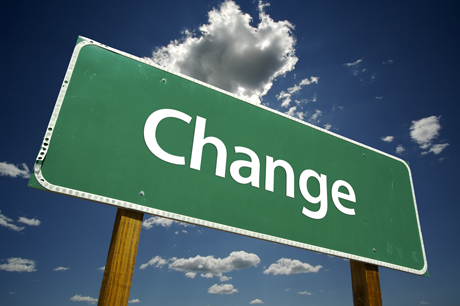
We’ve all been there – the moment life as you know it changes. You lose a job, a relationship ends, or perhaps you have to move unexpectedly. Change can be scary, intimidating, and even though change is inevitable, most of us fight it tooth and nail.
I always joke that I am TERRIBLE at change. I panic at the thought of what has felt safe and secure being gone. But, like it or not my life has been in a constant state of flux for years. Divorce, job changes, teens dramas, the drug addiction/alcoholism (and recovery) of one of my children, the loss of both of my parents in less than a year and relationship ups and downs. It's enough to make me want to crawl into bed and pull the covers over my head. But thankfully I have a short attention span for feeling bad and generally, after a short while, I rally.
What if there was a way to work through it and come out on the other side, wiser and ever happier? That’s the premise of Dominique Browning’s best-selling book, “Slow Love: How I Lost My Job, Put on My Pajamas and Found Happiness”
After 13 years as editor-in-chief of House & Garden, Dominique Browning went to work one day and discovered the powers that be were shuttering her magazine. Browning was someone who loved her job, was great at it, and in many ways, was defined by it. With that structure gone, Browning, like many others facing a seismic change, had to completely recreate her life.
“I now feel what you have to do, at the loss of job, relationship, a health challenge, anything knocks us out, is to just stop and be,” says author Dominique Browning from her Rhode Island home. “It’s so easy to be filled with fear; it’s like being caught in a rip tide. Your first instinct is to thrash, then adrenaline starts –I thrashed myself to exhaustion.”
In “Slow Love” Browning shares her own journey, and helps readers by being so open about her own struggles and how she moved through her life-altering changes.
“We don’t give ourselves permission to be sad,” she says. “We’re told it’s bad to be sad, to be unhappy. For me it meant putting on my pajamas and really being in my pajamas – just being in the loss. We live in a culture that is so happiness oriented; you don’t want to ever admit to being unhappy, but I was.”
Browning wasn’t just going through a loss of her job; she was also coping with the end of a 10-year on-again off-again relationship with a man she calls, “Stroller” in the book because he was always walking away.
She may have put on her pajamas and allowed herself to be sad, but Browning says there’s a difference between taking some time and depression.
“If it becomes too dark one hopes you have friends who will tell you that maybe you need some help, if it tips from sadness to depression, that’s something different,” she says. “Before too long it’s important to get yourself moving physically – walking, swimming, running, yoga, gardening… moving gets your brain unstuck.”
You don’t have to look far for people whose lives have been up-ended by the loss of a job. So many things happen when you get that devastating news – the financial worries, concerns over health insurance for your family, the loss of self-confidence, it can be paralyzing, and make you feel awfully alone.
New Bedford psychotherapist, Valerie Letourneau says as hard as it may be to believe initially, big change can present opportunities we not have had otherwise.
“We are creatures of habit, we like to feel safe and secure,” she says. “Some people when faced with change go into survival mode – calling every contact they can think of that evening, and then some become paralyzed by the enormity of what has happened.”
What she suggests is something in the middle, taking action, but taking time.
“First, give yourself time to absorb the news. We identify ourselves by our profession, so if you’ve lost your job, you lose that identity and feel you’re inadequate,” she says. “Then, take stock of all your skills. If you’ve been in a job for a long time you might not even realize all the things you could do. This is the time to think outside the box.”
Letourneau suggests rallying support rather than hunkering down by yourself.
“When big change gets thrown at you, self-esteem can go hit the floor, talking about it can help you,” she says.
So can getting moving to help with any stress and depression you may be experiencing.
“I tell people when they first come to me to start with just walking 15 minutes twice a day. I tell them to just give me two weeks of trying it and I bet they will see a difference in how they feel.”
She says it may be hard to believe initially when you’re shocked by the breakup, job loss or other huge change, but quite often it ends up being the best thing that ever happened to you.
“It’s easy to keep doing the same thing, but sometimes when change is forced on you it can lead to a place you might not have gone to,” she says. “People start businesses, go back to school, and do all sorts of things they might never have tried. It can end up being the best thing that ever happened to you.”
No comments:
Post a Comment